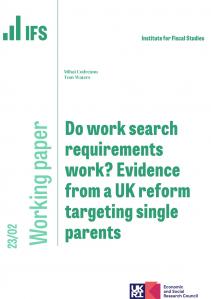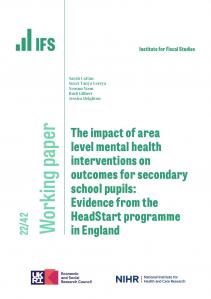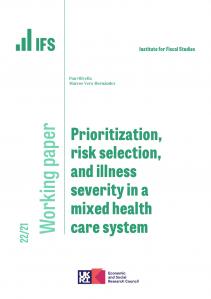The Office for Budget Responsibility's (OBR's) second fiscal sustainability report, published today, reminds us of the daunting task facing governments even after the current economic and fiscal crisis has abated. Demographic change and the potential loss of revenue from some important taxes will open up a further hole in the public finances of the same sort of magnitude as that which the current fiscal consolidation is designed to deal with. In other words we are likely to need to find many tens of billions of pounds, and probably another £100 billion or more, of spending cuts and tax increases to deal with these pressures.
There is some good news. We do have some time to prepare. Whilst the current £123 billion of fiscal consolidation is planned to take place over a seven year period, the OBR is looking 50 years ahead. In addition there are signs that the government is paying some heed to growing demographic pressures - announcements, for example, to increase state pension ages to 66 by 2020 and 67 in 2026 with the possibility of then linking it to changes in longevity.
But the scale of the change is such that much more will be required. On the spending side there are two main budgets which, under current policies, will be dramatically increased by demographic change - that for state pensions and that for health care. As we showed, based on last year's OBR report, even on conservative assumptions, between them health and pensions are projected to account for half of everything that government does by 2060. As today's OBR report illustrates in stark terms, there are really big uncertainties here about what will happen to health spending. If it increases only as a result of ageing, it will take up an additional 2.3% of national income by 2060. If, on the other hand, spending on health rises faster than this - as it has typically done in the past - as productivity rises less fast than in the rest of the economy, then spending on health could more than double to over 16% of national income. If taxes aren't increased to accommodate these costs then other budgets will have to be squeezed quite dramatically or the quality and quantity of services provided free at the point of use by the NHS scaled back considerably.
As we also pointed out, to some significant extent the state has already adjusted to shifting pressures. Demographic change and spending pressures are not new. In 1979, health accounted for one pound in every ten spent by government. That proportion has already nearly doubled. It is set to go on rising. Social security spending has also taken an increased share of spending over the last 30 years rising from 23% of the total to 29%. That means of course that other elements of spending have been squeezed - defence, housing and support for industry have all lost out. Are there now budgets which can cope with a similar squeeze over the coming decades? The housing budget has all but disappeared as has government spending on industry and subsidies for teaching at universities. There is a limit to what can be found from defence. Budgets for the Ministry of Justice, the Home Office and grants to local government are all being cut by more than a fifth over this spending review period with more pressure likely to come in the next period. Low hanging fruit is becoming harder to find.
So what about the other side of the government balance sheet - tax revenues? Here, unfortunately, the OBR also paints a rather gloomy picture with respect to some significant sources of revenue which are in imminent danger of falling or disappearing entirely. We have seen in the last month how difficult this government, in common with its predecessor, is finding raising fuel duties even in line with inflation. Put this alongside increasing efficiency of cars and the result is a long term decline in revenues from a tax which currently raises around £30 billion a year. This decline is likely to continue and, if we are to meet our climate change targets, these revenues should eventually disappear entirely. As we have argued the long standing economic case for moving to a system of road user charging is becoming ever stronger.
Other pressures on the revenue side include those on taxes from North Sea oil and gas, which the OBR forecasts will fall to very low levels by 2040. In addition there are likely to be continuing pressures on other tax bases, notably corporation tax, as a result of globalisation and potentially increasingly fierce international tax competition. Up until now industrialised countries, including the UK, have been remarkably successful at maintaining corporate tax revenues over long periods (despite high profile cases of large companies managing to minimise tax payments). But we are beginning to see international constraints impact on tax system design, not least in the introduction of the so called 'patent box' designed to impose a much lower rate of corporation tax on profits derived from patents - profits which are considered more internationally mobile.
Of course the future is uncertain. But the OBR's report highlights an inescapable fact - we will need to make a whole series of very big and serious choices over the coming decades about the type of state we want to live in. In the end we have only three choices - increase taxes, rein in and reform spending on health and pensions, or cut other areas of spending. There really is no fourth way.
As we have said before this requires a serious debate. We need to think about how we want to run and fund our health service. We urgently need a serious debate about the structure of our tax system. At the very least we will need to replace the revenues lost from motoring, oil and, probably, corporate taxes. If we decide to accommodate some of the spending pressures by taxing more, then some combination of income tax, National Insurance Contributions and VAT are likely to have to take the strain. As we have argued forcefully in the Mirrlees Review there are many ways of changing the tax system to make it more efficient. If we are to do more with the system then it becomes all the more important that it be as efficient as possible. And that will mean tackling some long standing problems that politicians of all persuasions have consistently shied away from. As well as needing to grasp the nettle of road pricing we need, among much else, to sort out a VAT system which applies zero rates to more spending than almost any other comparable country, a council tax system which remains based on relative house prices in 1991 and is regressive with respect to its tax base, and our income tax and national insurance systems that run pointlessly and confusingly in parallel with one another.
The OBR's analysis is welcome and it is powerful. It should be sparking a national debate about how to respond to the challenges it is warning us about.
IFS public finance observations are generously supported by the Economic and Social Research Council (ESRC).










